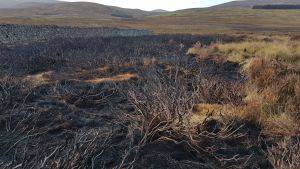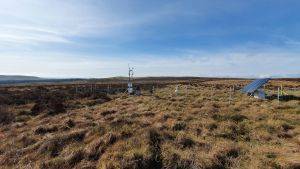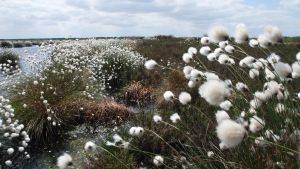What is it?
Peatland restoration is a burgeoning vocation within the conservation sector, yet there has been no nationally recognised accredited training programme. Developed by Yorkshire Wildlife Trust in partnership with the Welsh Peatlands Sustainable Management Scheme (SMS) Project, the Peatland Restoration Practitioner training course now provides this validation, through LANTRA, with support from the IUCN UK Peatland Programme.
Attendees will gain accreditation in peatland restoration and acquire best practice from practitioners with substantial experience in peatland ecology, management and restoration. The training will be delivered by YPP’s Restoration Team including Dr. Tim Thom, Dr. Chris Miller and Ollie Mackrill of Yorkshire Peat Partnership, all experienced trainers. YPP is a landscape scale programme delivering practical peatland restoration, through Yorkshire Wildlife Trust, across Yorkshire for over 10 years. On completion, participants will be able to apply best practice in all aspects of planning, delivering and monitoring peatland restoration.
What will be taught?
The programme consists of:
- 8 topics delivered over 2 separate 3-day sessions. Part 1 will focus on the preparation phase while Part 2 will focus on delivery.
Topics covered:
- Peatland ecology – develop an understanding of peatland ecology; environmental benefits of peatlands; historic and current threats; sustainable peatland management.
- Health and safety – address on-site health and safety issues; compile site and task risk assessments; determine the role each stakeholder should undertake under the Construction Design and Management Regulations (CDM) 2015.
- Surveying – will help distinguish and explain the differences between good and degraded peatland vegetation communities; identify appropriate survey techniques for different types of peatlands; pre- and post- survey mapping for damaged peatlands; assess erosion features; make recommendations for peatland restoration using QGIS.
- Practical restoration – will explain the different categories of restoration interventions and their impacts on peatland.
- Developing restoration plans – learn to interpret a range of data (satellite and UAV imagery, photos, site assessment vegetation data using QGIS, hydrological monitoring) to guide recommendations; address the objectives in a brief; scale back work to meet the budget using QGIS; explore future management recommendations for land managers post-capital works.
- Delivering restoration and evaluating success – follow the capital works tendering process; acquire consents; conduct services and utilities checks; instigate archaeological assessments; compile access agreements.
- Advocacy – explore advocating peatland restoration in restoration plan meetings with stakeholders; develop techniques to address challenging situations
- Funding and potential future funding streams – recognise funding opportunities; understand match funding methods; learn about carbon schemes, The Peatland Code and payments for ecosystem services.
How will it be taught?
The course will be fully interactive and, in order to gain accreditation, attendees will need to participate throughout. It will be delivered through a mixture of classroom-based sessions comprising of presentations, interactive workshops and activities. The course will include 2 field trip days to different peatland sites. These field trips offer the opportunity to practise some field skills on site and to review aspects of the course in situ.
How to book ?
Given current events, we are reviewing our booking process and hope to be able to advertise the course next year. If you are interested, or would like more information, please email info@yppartnership.org.uk.
Photograph: © Matt Snelling









